Staff at a zoo near Birmingham have been left baffled by a miraculous ‘virgin birth’ in their lizard house.
A female casque-headed iguana, native to Mexico and Central America, has produced eight babies at the Exotic Zoo in Telford, Shropshire.
But what’s really strange is the mother, called Carol, has never been in contact with a male.
Scott Adams, managing director of the Exotic Zoo in Telford, called it ‘one of the rarest events in the animal kingdom’.
‘We’ve got eight little babies but we’ve only got a female casque-headed iguana,’ he told BBC Radio Shropshire.
‘So we were quite surprised when our long-term resident decided to lay some eggs.
‘We thought we’d pop them in the incubator… a couple of months later we got eight little babies running around.
‘What’s happened is she’s had a virgin birth shall we say.’
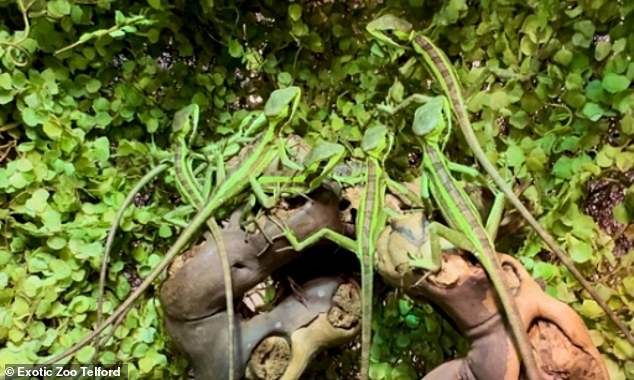
The eight hatchlings are ‘identical’ genetic clones of their mother – who gave birth without having sex with a male
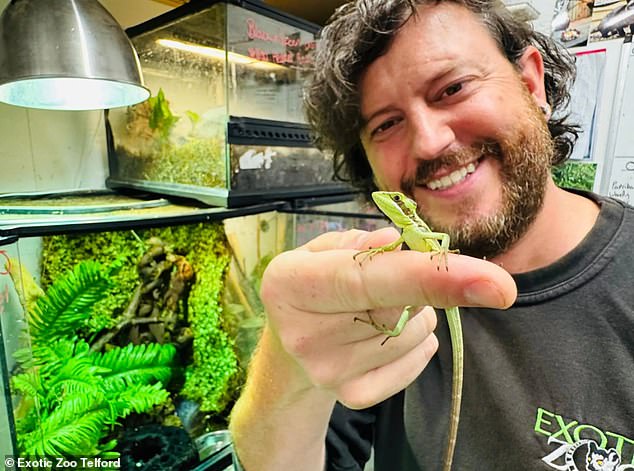
Scott Adams, owner of the Exotic Zoo in Telford, Shropshire (pictured with a baby), called it ‘one of the rarest events in the animal kingdom’
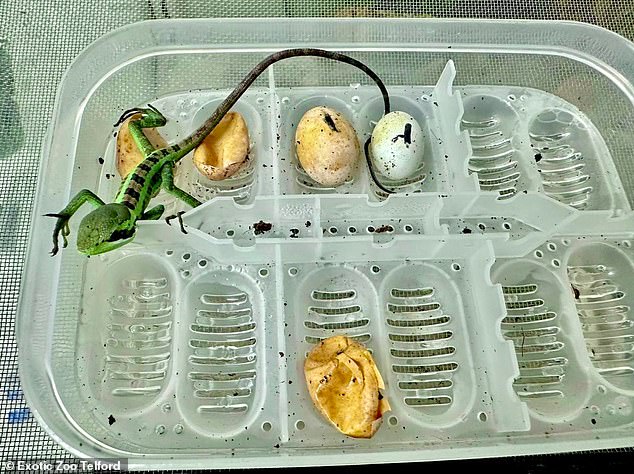
Staff were quite surprised when their long-term resident Carol the casque-headed iguana ‘decided to lay some eggs’
The birth in August is thought to be the result of parthenogenesis – a rare type of asexual reproduction where offspring develop from unfertilised eggs.
Parthenogenesis is extremely rare in nature, although it is found in some other species, most notably mayflies, turkeys, pythons and boa constrictors.
It is not entirely clear what triggers certain species to undergo this process, or what connects the species that have this capability.
But some research suggests that endangered animals might do so more frequently as finding a mate becomes harder.
These eight lizard hatchlings are now living under special temperature and humidity conditions to simulate their tropical habitat.
They are ‘identical’ genetic clones of their mother – right down to their sex.
‘This is what happens with parthenogenesis – there’s no boys in there, they’re all girls,’ said Mr Adams.
‘But potentially if they were in the wild and there were no males around they could go out and carry on repopulating.
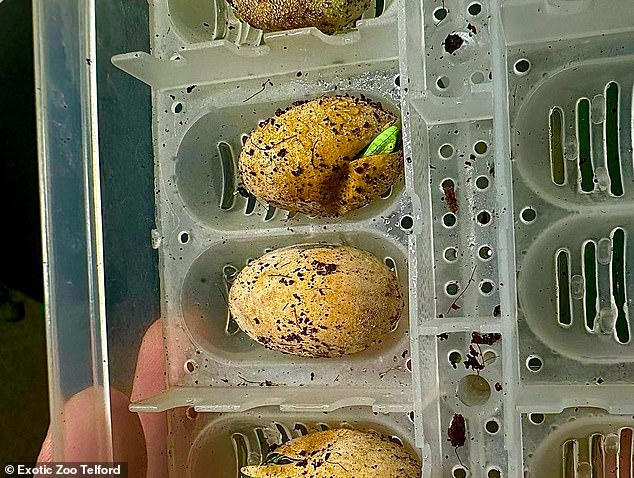
The hatchlings are ‘identical’ genetic clones of their mother – right down to their sex. Pictured, a baby poking out of the egg
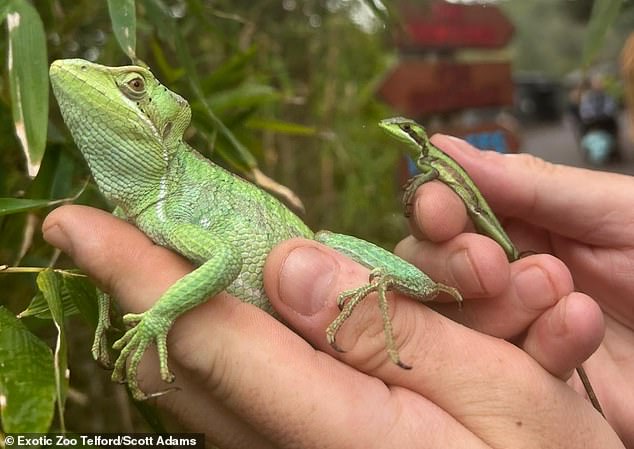
Mother and daughter: All eight of the miracle babies are female, as dictated by parthenogenesis, a rare type of asexual reproduction
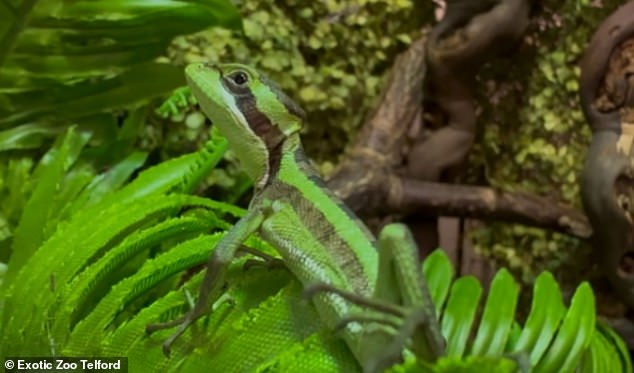
The ‘striking’ babies have got beautiful lime green and jet black stripes. It is not entirely clear what triggers certain species to undergo parthenogenesis
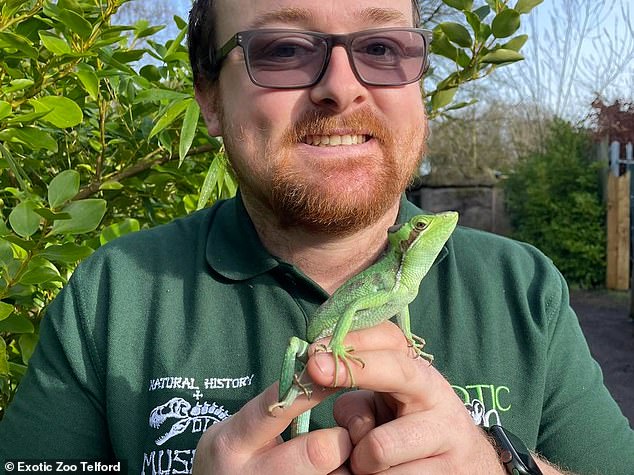
Ryan Jordan, head keeper at Exotic Zoo in Telford holds the mum, called Carol, who has never been with a male
‘It’s kind of a “life finds a way” story, and that’s what this lizard can do.’
At the moment, the lizard mother is on display in the zoo, while the babies are being kept behind the scenes – akin to what happens in the wild.
‘Like most reptiles, most will lay some eggs, and then off they go and that’s it, so it really is survival of the fittest,’ the expert added.
The casque-headed iguana is primarily a tree-living species found in the tropical rainforests of Central America and Mexico.
About 60 per cent of the species’ body is its tail, which is used to aid balance, perfect for life high up in the canopy along with its extremely long legs.
‘You can see from their massive back legs that they’re going to be great at running,’ Mr Adams added.
‘At the moment they’ve got beautiful lime green and jet black stripes, so they’re striking, they’re stunning. In the greenery with those colours they have fantastic camouflage as well.’
The eight miracle siblings will be going on display to the public ‘very soon, a zoo spokesperson told the Daily Mail. However, they will be separated, as other zoos have expressed an interest in putting some of them on display.
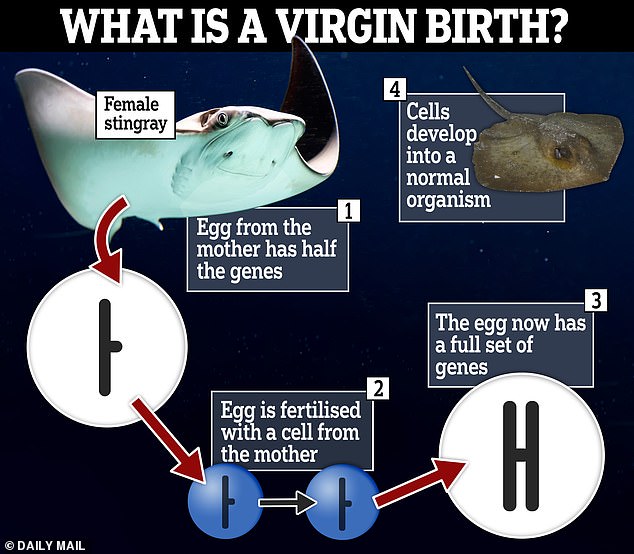
Certain animals are capable of reproducing through ‘parthenogenesis’ in which the egg is fertilised with cells from the mother rather than by a male
Virgin births like this are rare in nature and in captivity, but similar cases do exist.
Earlier this year, an aquarium in Louisiana hosted the birth of a young swell shark born in an all-female tank.
And in 2024, a boa constrictor at a school in Portsmouth gave birth to 14 babies despite not having the opportunity to mate.
Prior to this, a stingray called Charlotte in North Carolina was said to be pregnant due to parthenogenesis, having not shared a tank with a male.
Charlotte the stingray died due to a rare reproductive disease – although doubts over her pregnancy were later revealed.












